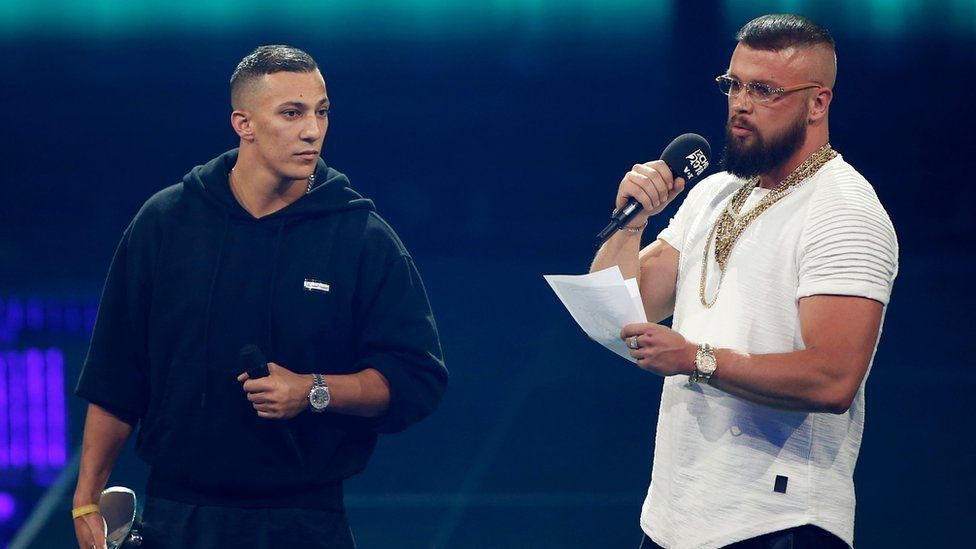Auschwitz rap: German Echo music prize scrapped in anti-Semitism row
- Published

Germany's music industry is abolishing its prestigious Echo prize, after an outcry over its award to a rap duo with lyrics denounced as anti-Semitic.
German rappers Kollegah and Farid Bang won the hip-hop/urban prize for an album featuring verses comparing their muscles to an Auschwitz survivor.
The music industry said it did not want the Echo to be seen as a platform for anti-Semitism.
The brand was so badly damaged a completely new start was needed.
Germany's Jewish community has faced a wave of attacks and threats in recent months, described by Chancellor Angela Merkel as "a new phenomenon" distinct from the old, far-right anti-Semitism.
"We have many refugees among whom there are, for example, people of Arab origin who bring another form of anti-Semitism into the country," she said at the weekend.
What has been happening?
Berlin and several other German cities were holding rallies against anti-Semitism on Wednesday. Those taking part were urged to wear kippahs (Jewish skullcaps) to show their support for the Jewish community.
Last week, two young men wearing kippahs were attacked by a man shouting anti-Semitic abuse in Berlin.
One rally was called off in the Neukölln area of the capital on Wednesday after organisers said they were spat on and called terrorists. An Israeli flag was seized by a passerby.
Footage of last week's attack in the Prenzlauer Berg area of Berlin
What were the offending lyrics?
The decision to award Kollegah and Farid Bang the best rap album prize for their album JBG3 (Young, brutal, good looking 3) led to a succession of musicians handing back their Echo awards in protest.
One of the tracks on their album, 0815, includes the line: "My body is more defined than those of Auschwitz inmates."
Another includes the words: "I'm doing another Holocaust, coming with the Molotov."
Berlin-based conductor Daniel Barenboim said he was returning his prizes in protest at the rappers' lyrics which he condemned as "clearly anti-Semitic, misogynist, homophobic and contemptuous of human dignity".
Rock singer Marius Müller-Westernhagen said he would be handing back the seven Echos he had won since the 1990s. Others include pianist Igor Levit and renowned musician and record producer Klaus Voormann, who designed the Beatles' Revolver album cover.
But the most searing criticism came on the night of the awards when the lead singer of Die Toten Hosen spoke out on stage after winning the rock award. It was one thing to be provocative, but using misogynist, homophobic, far-right or anti-Semitic content was crossing a line, said Campino.
How has the music industry responded?
Kollegah, a Muslim convert, has apologised for his Auschwitz lyric.
He said on the night he did not want to engage in political debate. "We are here to party" he said.
The duo's record company, BMG, which has sold more than 200,000 copies of the album, said it was utterly opposed to anti-Semitism and pledged to contribute to a campaign against anti-Semitism.
The Echo classical and jazz prizes, due to be awarded at the end of May, will also be affected by the German industry's decision to scrap the brand.
In its statement the German music industry association (BVMI) said Germany had the third largest music market in the world and still needed to recognise artists who crossed genres and generations.